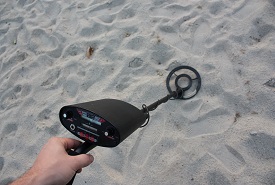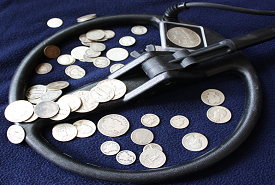Why Beach Metal Detecting? What is so Good About the Beach?
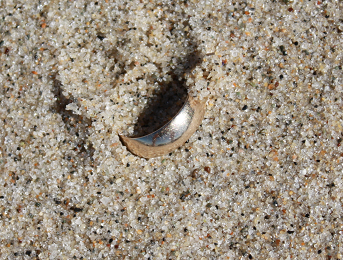 Where do tourists often flock in the heat of summer?
Where do tourists often flock in the heat of summer?
How long have they been going to the beach?
Aren’t beaches notorious for crowds?
Doesn’t sunscreen and sweat make your fingers slippery, sending rings flying into the sand?
Didn’t old ships sink off the coast filled with treasure?
These questions should give you an idea of why beach metal detecting is so popular and why there are so many dedicated beach metal detectors out there!
What is the Difference Between Wet and Dry Sand Beach Metal Detecting?
Dry sand hunting: Every part of the beach where sea water regularly doesn’t touch. Many beaches have vast areas of dry sand. Metal detecting on the dry sand is great because every metal detector can handle it with ease. Also, it is very easy to dig up targets. So if you are looking to enter into metal detecting on the beach have a look my page on beginner metal detectors. Additionally, if you have been a regular hunter for a while and have a relic machine it will work great in the dry sand. The dry sand tends to be filled with trash including aluminum cans, bobby pins, bottle caps, you name it. Discrimination is essential because with most beaches you have a lot of sand to cover. The ability to pick and choose what you dig based on what your detector tells you is going to improve your efficiency greatly. You can expect to find coins, phones, and jewelry. Pretty much anything left behind by beachgoers. I have regularly found bracelets, necklaces, watches, and rings. If this sounds like fun to you, grab your beginner or relic machine and hit the sand. However, if you are regularly hunting the dry sand, the wet sand and water will beckon you…it’s only a matter of time.
The wet sand and water: This is a whole different ball game. Much like gold nugget hunting or relic hunting, you are going to need a specific detector designed for the water like the ones detailed below. Hunting in the water is tough work. Here in Southern California it can be down right dangerous with the waves and rip currents. The wet sand is just more labor intensive than the dry sand. So is it worth it? YES! While I have found jewelry in both the wet and dry sand, the wet sand finds have been significantly more valuable. Also, I have found several old coins in the wet sand that have been washed up from a recent storm. If you are a regular dry sand hunter it may be time to step up to wet/water metal detecting!
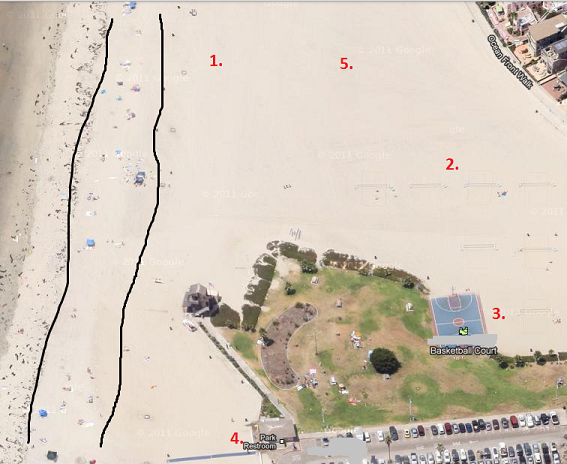 The above description of dry sand and wet sand hunting should give you a base for what to expect when you are metal detecting in those areas. However, If you are looking for some specific ideas on where to detect on your favorite beach, checkout my webpage dedicated to hunting both the dry sand and wet sand. This page describes the most popular spots on the dry sand that I call “hotspots”, which are places where you want to concentrate your metal detecting. Additionally, I discuss factors that are important to wet sand hunting as well as certain sand conditions to look for to maximize your discovery of potential goodies. Be sure to check out my webpage detailing my Beach Metal Detecting Tips.
The above description of dry sand and wet sand hunting should give you a base for what to expect when you are metal detecting in those areas. However, If you are looking for some specific ideas on where to detect on your favorite beach, checkout my webpage dedicated to hunting both the dry sand and wet sand. This page describes the most popular spots on the dry sand that I call “hotspots”, which are places where you want to concentrate your metal detecting. Additionally, I discuss factors that are important to wet sand hunting as well as certain sand conditions to look for to maximize your discovery of potential goodies. Be sure to check out my webpage detailing my Beach Metal Detecting Tips.
What is Stopping My Beginner Metal Detector From Detecting the Wet Sand?
So you have been metal detecting on the beach with your detector such as a Garrett ACE series or a Bounty Hunter and you have tried it in the wet sand and it keeps beeping with no target below? This is normal! These are called false targets. You now need to think about getting a dedicated beach metal detector.
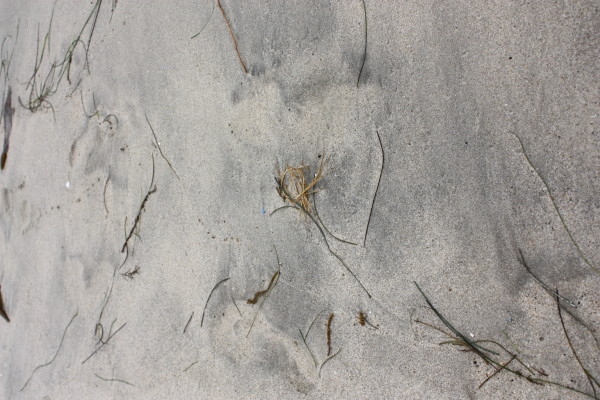
There are two things standing in the way of your basic metal detector functioning properly in the wet sand and water. Salt water and the dreaded black sand! Here is an example of some black sand mixed in with the regular beach sand. Why is black sand so difficult? The minerals that make up that sand. It’s filled with iron which is highly conductive and can throw off many entry level metal detectors.
Below Are Great Waterproof Wet/Dry Sand Metal Detectors That Cut Through the Black Sand With Ease, But How Do These Beach Metal Detectors Work?
It’s all about the technology inside of course, specifically magnetic fields and the distortion caused by the metal objects in the ground (which your detector reads). There are several types of beach metal detectors. The two most common are very low frequency (VLF) technology or pulse induction (PI) technology. Each of these produces and reads magnetic fields in different ways. (VLF) technology uses two coils, the outer coil which is the transmitter and the receiver which is the inner coil. The transmitter coil creates an electromagnetic field that moves through the sand below, once it discovers a metal object, the magnetic field created is picked up by the receiver coil. Based on the frequency of the transmitter coil there is a phenomenon called phase shifting which allows the detector to discriminate what type of metal it is based on how easily the metal conducts electricity. (PI) technology can have both the transmitter and receiver in the same coil, but they can also be in separate loops within the coil. The coil sends out short pulses that create magnetic fields that then reflect back once the pulse has ended, sending back a reflected pulse to the receiver coil. The metal detector has circuits that measure that reflected pulse to determine if there is metal below but does not determine what type of metal it is.
What is the Difference Between Pulse Induction(PI) and Very Low Frequency(VLF) Metal Detectors?
Well VLF will give you great target identification and the ability to discriminate out iron at the cost of depth. PI will give you maximum depth at the cost of target identification. How much depth is lost with VLF, that depends on location, settings, etc. Its usually not much but inches can make a difference. You have to decide what is more important, do you want to dig everything or do you want to pick and choose but give up some depth. It really boils down to the type of beach. Some beaches are infested with iron bits, making the VLF ideal, while others are nice white sand beaches with few targets, making the PI a perfect fit.

What sets the Garrett AT Pro apart from the competition is the LCD Screen with button interface, auto/manual ground balance, and a wide range of settings for both the novice & professional. This VLF machine is suited for mostly dry sand, occasional wet sand, and little water usage (waterproof to only 10 feet). Click here for Garrett AT Pro information and settings.
The Best Underwater Metal Detector
The Garrett AT Pro is a great beach metal detector but it is only rated to 10 feet. The underwater metal detectors below use either PI or VLF technology but what makes them suited to the water is they are all rated to go 200 ft. While that seems perfect for treasure divers it also makes them great for the shallow water because they are all built to withstand salt water and water pressure. I do not dive with my Excalibur II but I know I can take it in the shallow water and not worry about any type of damage. If you see yourself detecting in the wet sand and shallow water, take a look at these underwater metal detectors.

The Tesoro Sand Shark Underwater Metal Detector has a lifetime warranty, low price, and pulse induction technology (PI). This machine is suited for the water and wet sand, less so in the dry sand (due to lack of discrimination). Click here for Tesoro Sand Shark information and settings.
Garrett Infinium LS Metal Detector
The Garrett Infinium LS Underwater Metal Detector comes with PI technology , sensitivity to small gold as is doubles a gold nugget hunter. It is built tough and has the ability to exchange the coil depending on the type of hunting you choose to do. This detector is primarily suited for
the water and wet sand. You can find more Garrett Infinium LS information and settings here.
Fisher CZ21 Metal Detector
The Fisher CZ21 Underwater Metal Detector has multi frequency VLF technology which produces great depth and discrimination. This machine is suited for all aspects of the beach including the water, wet sand, and dry sand. Visit my webpage dedicated to Fisher CZ21 information and settings.

What sets the Minelab Excalibur II Underwater Metal Detector apart from the competition is the BBS technology (VLF) which produces great depth and discrimination. This machine is suited for the water and wet sand, with occasional dry sand (This sucker is heavy). The Minelab Excalibur II can be customized in many ways to deal with the weight such as waist mounting or a new shaft. Click here for Minelab Excalibur II information and settings.

The Garrett ATX is a brand new metal detector from Garrett. It features pulse induction technology with a new iron check discrimination button for enhanced target identification. Also it is collapsible for easy storage and is extremely well built. This machine is designed to be an all terrain machine and is great in saltwater or nugget hunting. Click here for Garrett ATX information and settings.
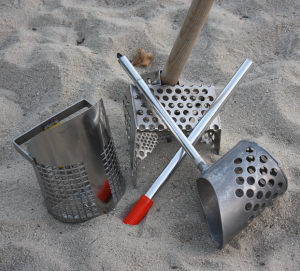 A durable, metal detecting sand scoop is probably the second most important item to have right behind the metal detector itself. Why? How else are you going to get the targets in the sand or even the water while metal detecting on the beach. Sand scoops come in different materials and different sizes depending on your budget. Some are great for the dry sands of the beach while others are heavier but designed to cut through the thickest wet sand. Have a look at my page dedicated to metal detecting sand scoops.
A durable, metal detecting sand scoop is probably the second most important item to have right behind the metal detector itself. Why? How else are you going to get the targets in the sand or even the water while metal detecting on the beach. Sand scoops come in different materials and different sizes depending on your budget. Some are great for the dry sands of the beach while others are heavier but designed to cut through the thickest wet sand. Have a look at my page dedicated to metal detecting sand scoops.
Buying New or Used Beach Metal Detectors:
If you are thinking about buying a beach metal detector or possibly a backup, the question of buying new or used is probably running through your mind.
Buying New: Buying a brand new metal detector is obviously going to be more expensive but you are getting the latest model and usually a mutli year warranty so you don’t have to worry about the detector breaking down unless you have bad luck. In my experience, if you maintain your metal detector it will run flawlessly for many years. Additionally, if you check amazon, many new metal detectors come with all the accessories you need to start metal detecting.
Buying Used: The best places to buy used metal detectors are Ebay, Craigslist, or checking with your local store that sells used detectors. The key with buying used detectors is reviewing the condition and while this sometimes may be difficult you need to find out WHY they are selling the detector. If it was used a couple times and the person just stopped using it, thats fine. However, if it has been sitting for years, you want to make sure it still functions properly and make sure the batteries still work (rechargeable). Also, look at the connection points and the coil cover. If there is a lot of markr or scratches this should tell you it is a heavily used machine. This goes double for submersible water metal detectors. Salt water is corrosive to electrical components. You can not just dry out a salt damaged detector, the salt stays behind. If it gets into the circuit boards of a metal detector it is a costly repair. Just remember to look over the detector carefully, and if you looking on Ebay they have a great return policy especially if the item doesn’t work. The key is to find lightly used metal detectors. Certain metal detector models also hold their value much better than others, this usually depends on the popularity, dependibility, and warranty of that specific metal detector (all the metal detectors discussed above). Check Ebay and look at “completed auctions” to get an average price of sold detectors that you are interested in to get a base used metal detector price.
Where to Get the Best Price on New or Used Metal Detectors?
There are many beach metal detectors on the market but I feel (again this is my opinion) the ones discussed above are the best in their respective tier because for their price you are getting the best bang for your buck. Also, these are established brands that have a strong following and great customer reviews. Have a look on Ebay for a wide variety of beach metal detectors:


